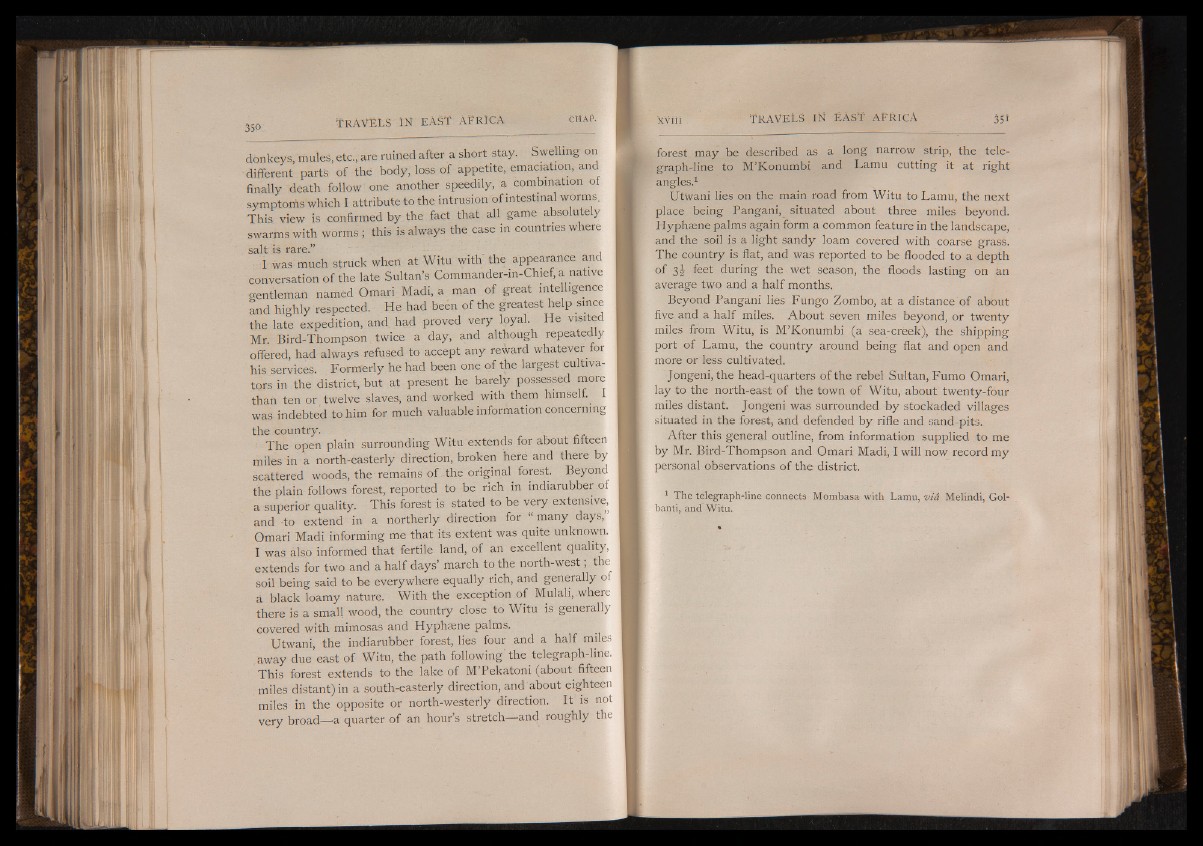
donkeys, mules, etc., are ruined after a short stay. Swelling on
different parts of the body, loss of appetite, emaciation, and
finally death follow one another speedily, a combination of
symptoms which I attribute to the intrusion of intestinal worms.
This view is confirmed by the fact that all game absolute y
swarms with worms ; this is always the c a s e in countries where
salt is rare.” : . : ' ! ' ~ 1 - - ’ »ifflSS. i
I was much struck when at Witu with the appearance and
conversation of the late Sultan’s Commander-in-Chief, a native
gentleman named Omari Madi, a man of great intelligence
and highly respected. He had been of the greatest help since
the late expedition, and had proved very loyal. He visited
Mr. Bird-Thompson twice a day, and although repeatedly
offered, had always refused to accept any reward whatever for
his services. Formerly he had been one of the largest cultivators
in the district, but at present he barely possessed more
than ten or twelve slaves, and worked with them himself. I
was indebted to him for much valuable information concerning
the country.
: The open plain surrounding Witu extends for about fifteen
miles in a north-easterly direction, broken here and there by
scattered w o o d s , the remains of the original forest. Beyond
the plain follows forest, reported to be rich in indiarubber of
a superior quality. This forest is stated to be very extensive,
and -to extend in a northerly direction for “ many days, ’
Omari Madi informing me that its extent was quite unknown.
I was also informed that fertile land, of an excellent qualiw,
extends for two and a half days’ march to the north-west; the
soil being said to be everywhere equally rich, and generally of
a black loamy nature. With the exception of Mulali, where
there is a small wood, the country close to Witu is generally
covered with mimosas and Hyphaene palms.
Utwani, the indiarubber forest, lies four and a half miles
away due east of Witu, the path following the telegraph-line.
This forest extends to the lake of M’Pekatoni (about fifteen
miles distant) in a south-easterly direction, and about eighteen
miles in the opposite or north-westerly direction. It is not
very broad— a quarter of an hour’s stretch— and roughly the
forest may be described as a long narrow strip, the telegraph
line to M’Konumbi and Lamu cutting it at right
angles.1
Utwani lies on the main road from Witu to Lamu, the next
place being Pangani, situated about three miles beyond.
Hyphaene palms again form a common feature in the landscape,
and the soil is a light sandy loam covered with coarse grass.
The country is flat, and was reported to be flooded to a depth
of feet during the wet season, the floods lasting on an
average two and a half months.
Beyond Pangani lies Fungo Zombo, at a distance of about
five and a half miles. About seven miles beyond, or twenty
miles from Witu, is M’Konumbi (a sea-creek), the shipping
port of Lamu, the country around being flat and open and
more or less cultivated.
Jongeni, the head-quarters of the rebel Sultan, Fumo Omari,
lay to the north-east of the town of Witu, about twenty-four
miles distant. Jongeni was surrounded by stockaded villages
situated in the forest, and defended by rifle and sand-pits.
After this general outline, from information supplied to me
by Mr. Bird-Thompson and Omari Madi, I will now record my
personal observations of the district.
1 The telegraph-line connects Mombasa with Lamu, vid Melindi, Gol-
banti, and Witu.